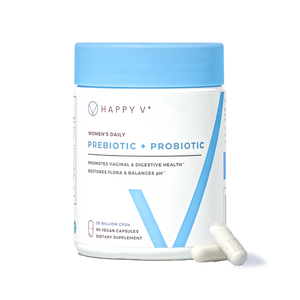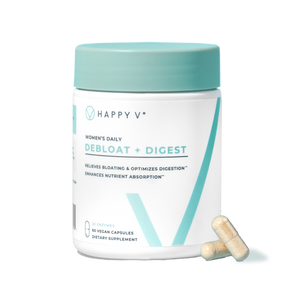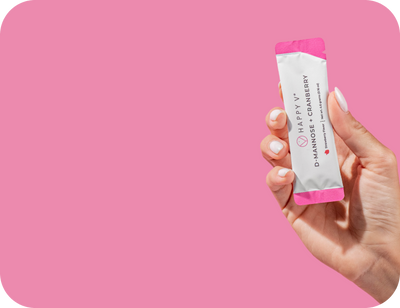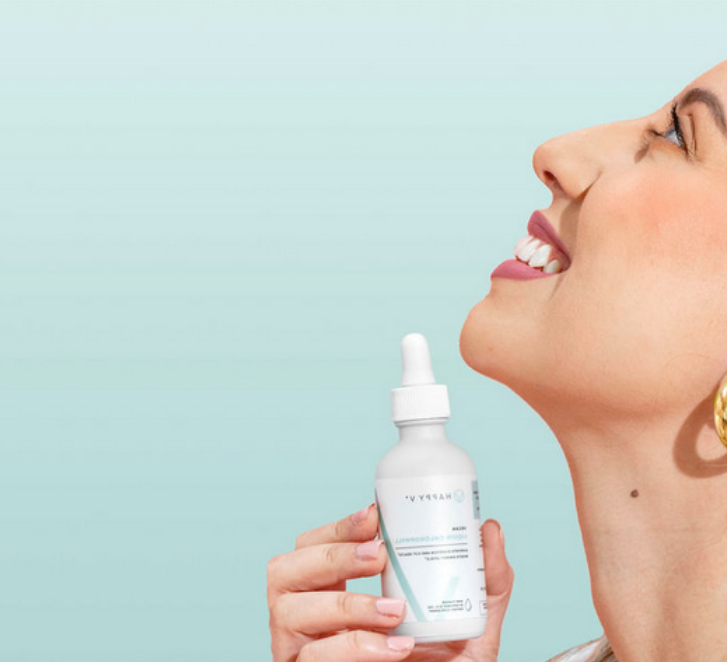
- Fact Checked
- November 15, 2025
- 7 min read
Home Remedies for Fishy Vaginal Odor: Natural Ways to Support Freshness
Table of Contents
Table of Contents
When something smells a little off down there, it's easy to panic-Google or reach for whatever the internet says will “fix” it fast. But not all home remedies are created equal, and some can actually throw your vaginal health waaaaay off track.
Before you reach for garlic, scented sprays, or DIY concoctions, let’s talk about what not to do. Because at Happy V, we’re all about giving your body the science-backed support it needs, without the side effects.
This post is for informational purposes only and does not constitute medical advice. See full disclaimer below.
What Causes Fishy Vaginal Odor?

Here’s the thing: vaginas don’t smell like flowers. Like, ever. So a vaginal odor in and of itself is not always a sign that something’s wrong. But if your vaginal odor is strong, fishy, and accompanied by unusual discharge, itchiness, or irritation, it may point to an underlying issue.
One of the most common causes of fishy odor is bacterial vaginosis (BV), a type of vaginitis caused by an overgrowth of harmful bacteria in the vagina1.
In a healthy vagina, good bacteria known as lactobacilli help keep pH levels slightly acidic2, which helps to prevent the overgrowth of harmful, infection-causing bacteria. But when the balance of bacteria is thrown off due to hormonal changes, sexual activity, or even excessive cleansing, BV and its trademark fishy smell can develop3.

While BV is the most common cause of fishy smells, it isn’t the only one. Other culprits include:
- Trichomoniasis: A sexually transmitted infection (STI) caused by a parasite, often with a foul-smelling vaginal discharge4
- Hormonal changes during menstruation, menopause, or birth control use
- Left-in tampons, which can cause a strong-smelling or unpleasant odor
Home Remedies for Vaginal Odor

If you’re noticing a fishy smell or strong vaginal odor, the first thing to do is see a doctor to pinpoint the cause. Then, think about how you can utilize proven home remedies to improve your vaginal health and restore the balance of healthy bacteria in your vaginal flora.
Note that these remedies are not considered treatments for active infections like BV or trichomoniasis. They can, however, be used alongside and following doctor-prescribed antibiotic treatments to prevent the odors from coming back.
1. Rinse with Warm Water Only
Skip the scented soaps, fragrances, and sprays. Though they smell great, they often get their smells from chemicals that can hurt the healthy lactobacilli.
If you want to clean your vulva (aka the external genital area), use only warm water and mild, unscented soap, and avoid washing inside the vagina (aka douching), which can disrupt vaginal flora and lead to more odor5.
2. Wear Breathable Cotton Underwear
Tight-fitting, non-breathable fabrics trap moisture and heat, creating a perfect environment for odor-causing and harmful bacteria. Swap synthetics for cotton underwear, and skip underwear altogether at night to help the area breathe.
3. Prioritize Hydration
Drinking plenty of water helps flush your system and supports regular urination, which naturally helps remove bacteria from the urinary tract and vaginal area. Staying hydrated also supports skin health and vaginal pH balance.
4. Take a Probiotic Supplement

Probiotics with clinically studied lactobacilli strains like Lactobacillus acidophilus and L. rhamnosus can help restore a healthy vaginal microbiome6, especially if your symptoms are linked to bacterial vaginosis or recurring yeast infections.
Happy V’s Probiotics are made using these clinically proven strains and formulated to support vaginal pH, reduce odor-causing bacteria, and help maintain a balanced vaginal ecosystem, especially during hormonal changes, sexual activity, or after antibiotics.
5. Consider Apple Cider Vinegar (With Caution)
Some claim that soaking in a warm bath with a small amount of apple cider vinegar helps restore vaginal pH due to apple cider vinegar’s antimicrobial properties. While there’s limited clinical evidence to support this as a primary treatment, anecdotal reports suggest it may help reduce vaginal odor. Just avoid direct douching or inserting vinegar internally, which can worsen symptoms.
Remedies to Avoid (and Why)
Some approaches to managing vaginal odor can do more harm than good, especially when they disrupt your vaginal pH or irritate sensitive tissue.
While certain tips may sound natural or harmless, they often lack evidence and can interfere with the balance of good bacteria. Here are a few popular remedies best left out of your wellness routine.
1. Douching
Despite being marketed as a way to “freshen up,” douching can do more harm than good. In fact, almost all doctors in the women’s health field advise against it.
Douching disrupts the vaginal flora7, flushing out the good bacteria (like lactobacilli) that help keep pH balance in check. This creates an opening for harmful bacteria to grow, which may increase the risk of bacterial vaginosis, yeast infections, and sexually transmitted infections (STIs).
2. Scented Feminine Sprays or Wipes
Products that promise to eliminate vaginal odor with fragrance can be harsh on sensitive skin and the vaginal area. These sprays, wipes, and soaps can irritate the vulva, alter your vaginal pH, and make existing odors worse. They often mask the symptoms rather than address the root cause.
3. Garlic, Yogurt, or Other Foods Inserted Vaginally
While certain foods like garlic or yogurt have antibacterial properties when eaten, inserting them into the vagina can lead to irritation, allergic reactions, or even infection. There’s no reliable evidence that this helps with vaginal odor, and it may introduce unwanted bacteria.
4. DIY Apple Cider Vinegar Douches
We mentioned earlier that a warm water bath with diluted apple cider vinegar might offer mild support externally. But douching with vinegar (or inserting it vaginally) can severely irritate the delicate tissues and disturb the microbiome, making you more vulnerable to infection.
5. Overuse of Suppositories or “Detox” Products
Some over-the-counter suppositories are helpful when recommended by a healthcare provider, but using these too frequently—or choosing ones with harsh or unproven ingredients—can backfire.
Vaginas don’t need detoxing. Overuse of these products can disrupt your vaginal health and lead to ongoing discomfort.
Bottom line: If a product promises to eliminate vaginal smell instantly or isn’t backed by research, it’s best to steer clear. Stick with evidence-based remedies, like probiotics, and gentle hygiene practices, and check in with your healthcare provider if you’re unsure.
When to See a Healthcare Provider

While many vaginal smells are normal and vary with your menstrual cycle, any new, foul-smelling odor—especially a fishy odor—that comes with unusual vaginal discharge, itchiness, burning, or irritation should be evaluated by a healthcare provider or gynecologist.
You may need testing for:
- Bacterial vaginosis
- Trichomoniasis
- Yeast infections
- Other sexually transmitted infections (STIs)
Your provider may recommend prescription suppositories, antibiotics, or additional care if home remedies aren’t effective.
Final Thoughts
Vaginal odor, especially of the fishy variety, can feel embarrassing, but it’s more common than you think. The good news? In many cases, lifestyle changes, good hygiene, and gentle home remedies can support a return to balance and prevent recurrence after antibiotic treatment.
Supporting your vaginal health with probiotic-rich supplements, breathable fabrics, and hydration can go a long way in preventing odor-causing overgrowth. And if symptoms persist, don’t hesitate to seek medical advice.
Keep the Conversation Going
- Visit our blog for more on BV treatment options and women's health tips.
- Join our private Happy V Facebook group to hear from others who've been there.
- Explore supplements designed to support your vaginal health journey.
Disclaimer: This blog is for informational and educational purposes only and is not intended to diagnose, treat, cure, or prevent any disease. Statements about supplements have not been evaluated by the Food and Drug Administration. For more information about vaginal infections, visit the CDC or speak to a licensed healthcare provider.















